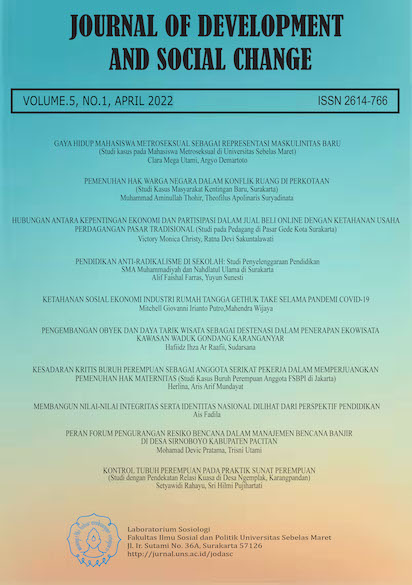RELASI GENDER DALAM KELUARGA PEREMPUAN OJEK-ONLINE DI SURAKARTA (Studi Deskriptif Pada Keluarga Perempuan Ojek-Online Go-Jek di Surakarta)
Abstract
This research aims to determine the activities division, access-control distribution, and the factors that influence the division of activities and access-control in the families of women-online taxibikers “Go-Jek” in Surakarta. Talcott Parsons’ Structural Functionalism theory is used in this research. This is a qualitative descriptive research. The data were collected from indepth interview, observation, and documentation. The subjects were the families of women-online taxibikers “Gojek in Surakarta. The researcher used source triangulation to examine the validity of the data. In analyzing the data, the researcher used Miles and Huberman’s theory which consisted of data reduction, data presentation, and drawing conclusion. In addition, Harvard’s analysis technique was also used to observe the gender’s profile within a family.
The results show that there are division of activities in the families of women-online taxibikers. The production activities in those families are carried out together, both husband and wife work together to earn a living. It proves that there are equal opportunities for the husband and wife in carrying out production activities. Whereas in reproductive activities, even though there is already a husband's involvement, the wife has more dominant role. In social activities, there are activities-differentiation for husband and wife although they are both involved in community activities. Men's activities are still regarded to be public-oriented, while women's activities are still related to reproductive matters. Regarding the access-control division, it is now done by the woman or wife more oftenly. The factors that influence the distribution of activities and access control in the families of women-online taxibikers “Go-Jek” are economic, cultural, and educational factors. It can be concluded that gender relations in the families of women-online taxibikers “Go-Jek” in Surakarta have complementary relationships. Although there are some differences in roles, they have the same goal, namely family harmony.
Full Text:
PDFReferences
Abdullah, Irwan. 2001. Seks, Gender dan Reproduksi Kekuasaan. Yogyakarta: Tarawang Press
Anonim. 2017. Pengertian Ojek Online. https://suduthukum.com/2017/03/ojek-online.html. Diakses pada tanggal 23 Juli 2019
Badan Pusat Statistik. 2018. Tingkat Partisipasi Angkatan Kerja (TPAK) 2018
Badan Pusat Statistik. 2018. IPG (Indeks Pembangunan Gender) 2018
Demartoto, Argyo. 2007. Menyibak Sensitivitas Gender dalam Keluarga Difabel. Surakarta : UNS Press.
Fakih, M. 2006. Analisis Gender dan Transformasi Sosial. Yogyakarta: Pustaka Pelajar.
Intyre, J. Mc. 1966. The Structure Fungsional Approach to Family Study. New York: The Mcmillan Co
Kartodirdjo, Sartono. 1982. Pemikiran Dan Perkembangan Historiografi Indonesia Suatu Alternatif . Jakarta: Gramedia
Khairuddin H. 1997. Sosiologi Keluarga. Yogyakarta : Nurcahaya
Lina, Sudarwati. 2003. Wanita Dan Struktur Sosial ( Suatu Analisa Tentang Peran Ganda Wanita Indonesia). Fakultas Ilmu Sosial Dan Ilmu Politik Universitas Sumatera Utara
Parsons, Talcott dan Bales, R.F. 1956. Socialization and Interaction Process. London: Routledge, Kegan & Paul
Matlin, M.W. 2004. The Psychology Of Women (5th Edition). Canada: Wadsworth.
Megawangi, R. 2001. Membiarkan Berbeda? Sudut Pandang Tentang Relasi. Gender. Bandung: Mizan Pustaka.
Milles dan Huberman. 1997. Analisis Data Kualitatif. Jakarta: Universitas Indonesia Press
Moleong, J Lexy. 2006. Metodologi Penelitian Kualitatif. Bandung: PT. Remaja Rosdakarya
Nugroho, Riant. 2008. Gender dan Strategi Pengarus-Utamaannya di Indonesia. Yogyakarta: Pustaka Pelajar.
Oxfam untuk Gender Learning Team. 1995. Pisau Bedah Gender
Undang-Undang Perkawinan No.1 tahun 1974
DOI: https://doi.org/10.20961/jodasc.v2i2.41665
Refbacks
- There are currently no refbacks.




